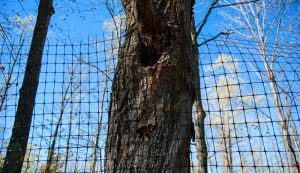
It happened when I was about nine. The public-school playground got a little boring, so a bunch of us found a maple tree just across the back fence of the schoolyard to climb, sit in and hang from. Word got around to the principal, Mr. Palmer Kilpatrick. If for no other reason than fear of liability, he announced that the tree was off limits.
That didn’t stop us. Next day, we headed back over the fence and scrambled back up the tree. Suddenly, it got quiet. All my fellow tree-climbers disappeared. I was alone. I looked down and there was Mr. Kilpatrick standing at the foot of the tree.
“Ted, come down,” he said sternly. “You know you’re not supposed to be up there.”
“Yes sir,” and I came down. Everybody else who’d climbed the tree with me that day had taken off. And I could have too. But something inside me said, “Fess up and face the consequences.” I did detention time. And there was a call home. My parents disciplined me for my error in judgment. In the case of Premier Doug Ford or Minister Steve Clark, I guess neither of them ever experienced this kind of character-building moment in their lives. Or, maybe they never got caught.
Until last week when the Toronto’s Star’s Martin Regg Cohn revealed comments that Ontario’s minister of housing delivered in the Ontario Legislature. In 2012, when sitting in Opposition, he criticized then finance minister Dwight Duncan for what he saw as waste at the Municipal Property Assessment Corporation.

“I can’t understand why you condone what’s happening with MPAC. … Do the honourable thing and resign,” Clark demanded.
This, after Minister Clark denied at two separate media conferences in the wake of Bonnie Lysyk’s damning Auditor General’s report (on August 9), that he had any idea his right-hand man, political staffer Ryan Amato personally chose 14 of 15 parcels of land to be removed from the Greenbelt and its protections against development.
I think he just won’t confess he’s caught up a tree.
I remember another instance when as a novice freelancer back in the 1970s, I learned about the responsibilities of such a decision. My wife and I lived in Alberta then. I’d begun writing music reviews and pop music features for several national newspapers as well as broadcasting on CBC Radio and National Public Radio in the U.S.
An accountant friend suggested that I incorporate so that I could take advantage of legitimate tax write-offs of my work – travel, supplies, long-distance phone calls, etc. I did as the accountant suggested. And within a year, the federal government contacted me to do a financial audit. I’ll admit I was frightened that I’d done something wrong and readily offered all my financial statements and tax data.
Sometime later they got back to me and said I needed to pay some additional taxes – several hundred dollars – and there was no penalty. I guessed I’d done the right thing to fulfill all the auditor’s recommendations.

In contrast, Premier Ford, responding to the audit on his plans to release 7,400 acres of Greenbelt lands for housing which the Auditor General said “could ultimately see more than a collective $8.3 billion increase in value to the value of (the developers’) properties,” said no, he would not agree to the auditor’s ultimate recommendation to halt the release of the 7,400 acres.
The stonewalling we’re witnessing from Minister Clark and Premier Ford, one op-ed editorial said this week, amounts to “a credibility-destroying catalogue of deceits.”
Then, there was the time I went to court. That’s right. One night coming home late from the city, a Durham Regional Police officer pulled me over on Taunton Road doing 80 km per hour in a 60 zone. I acknowledged he was right. He gave me a summons. I went to court some months later, and when the judge asked me to stand I did.
“How do you explain this? he asked.
“I wasn’t paying attention, You Honour. I was being selfish.”
The judge said he hoped I’d learned my lesson and told me to pay the fine. Which I did.
Our system of checks and balances in Canada – whether in our courts or our legislative assemblies – is not designed to punish inequitably. It’s designed to keep all of us – politicians and constituents – from making harmful mistakes.
The kinds of mistakes this Conservative administration dismisses and/or ignores even when exposed by the province’s most respected office of assessment, the Auditor General, speaks volumes about its lack of respect for authority and honest representation.
Mr. Kilpatrick would not be pleased.
Hope RCMP finds evidence to file charges of criminal conduct by the Ford Gov.